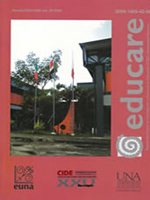Antecedente nacional e internacional sobre la percepción y los derechos de las niñas, los niños, los y las adolescentes
DOI:
https://doi.org/10.15359/ree.12-1.4Keywords:
protection of chidren, declaration of children rightsAbstract
Until the middle of the XVIII Century, children were considered as miniature adults, but with Jean Jacob Rousseau the study of the development of the human being was started and the foundation was set up for the new science of Paidology (the study of children), wich focuses on the different intellectual and physical conflicts which children face, and also for other sciencies such as Paidofilaxis, Pueroculture and Pediatrics.
The Society of Nations, created, in 1919, the Consultancy for the Trafficking of Women and the Protection of Children, and in Geneva, the International Union for Aid was founded in 1920. In Argentina, the First American Congress for Children was organized in 1916, and others followed. The first Declaration of Childrens Right was proclaimed in 1924 and then followed the first Ten Commandments of Childrens Rights.
In Costa Rica in 1929, a project was presented for the Constitutional Congress to establish an institution for the protection of children, wich was duly enacted into law in 1930 with the name of National Institution for the Protection of Children (Patronato Nacional de la Infancia, PANI) whose duty was to oversee the welfare of minors and their physical, intellectual, moral and emotional development. In 1930, the first Declaration of the Rights for Costarrican Children was proclaimed.
The creation of the PANI, the declaration of Childrens Rights, and the enactment of a Code for Infants (1932), constitute the three events that signal Costa Rica as one of the pioneers countries in Latin American and the World, in the protectionof children and mothers.
At the end of the article, some of the crucial events that have happened during the decades that PANI has been working in the country are analized.
References
Asamblea Legislativa. (1995). Constitución Política de la República de Costa Rica. Versión
Actualizada. San José: Publicaciones Jurídicas.
Asamblea Legislativa. (1949). Constitución Política de la República de Costa Rica. San José:
Publicaciones Jurídicas.
Junta Directiva Patronato Nacional de la Infancia. (1932). Acuerdo de aprobación de la Declaración
de los Derechos del Niño en vía admisnitrativa. Sin publicar.
Patronato Nacional de la Infancia. (1931). Primer Congreso Nacional del Niño. San José: Imprenta
Nacional.
Patronato Nacional de la Infancia. (1980). ¿Qué es el PANI?. San José: Taller de Planchas y
Suministros.
Patronato Nacional de la Infancia. (1990). Revista Especial 60 Aniversario. San José: Taller de
Planchas y Suministros.
Prada, P. (1980). El Ordenamiento Jurídico respecto a la Niñez y al PANI. Sin publicar.
Procuraduría General de la República. (1932). Colección de Leyes y Decretos. Ley número 27 del
de octubre. San José: Oficina de Publicaciones.
Save the Children. (2005). Convención sobre los Derechos del Niño. Lima: Editorial IMACOM.
Save the Children. (2003). Principales Declaraciones de los Derechos del Niño. Lima: Editorial
IMACOM.
Vicente R. (1999). Un Vistazo a los antecedentes del Código de Niñez y Adolescencia. San José:
Taller de Planchas y Suministros.
Downloads
Published
How to Cite
Issue
Section
License
1. In case the submitted paper is accepted for publication, the author(s) FREELY, COSTLESS, EXCLUSIVELY AND FOR AN INDEFINITE TERM transfer copyrights and patrimonial rights to Universidad Nacional (UNA, Costa Rica). For more details check the Originality Statement and Copyright Transfer Agreement
2. REUTILIZATION RIGHTS: UNA authorizes authors to use, for any purpose (among them selfarchiving or autoarchiving) and to publish in the Internet in any electronic site, the paper´'s final version, both approved and published (post print), as long as it is done with a non commercial purpose, does not generate derivates without previous consentment and recognizes both publisher's name and authorship.
3. The submission and possible publication of the paper in the Educare Electronic Journal is ruled by the Journal’s editorial policies, the institutional rules of Universidad Nacional and the laws of the Republic of Costa Rica. Additionally, any possible difference of opinion or future dispute shall be settled in accordance with the mechanisms of Alternative Dispute Resolution and the Costa Rican Jurisdiction.
4. In all cases, it is understood that the opinions issued are those of the authors and do not necessarily reflect the position and opinion of Educare, CIDE or Universidad Nacional, Costa Rica. It is also understood that, in the exercise of academic freedom, the authors have carried out a rogorous scientific-academic process of research, reflection and argumentation thar lays within the thematic scope of interest of the Journal.
5. The papers published by Educare Electronic Journal use a Creative Commons License:















 The articles published by Educare Electronic Journal can be shared with a Creative Commons License:
The articles published by Educare Electronic Journal can be shared with a Creative Commons License: 



